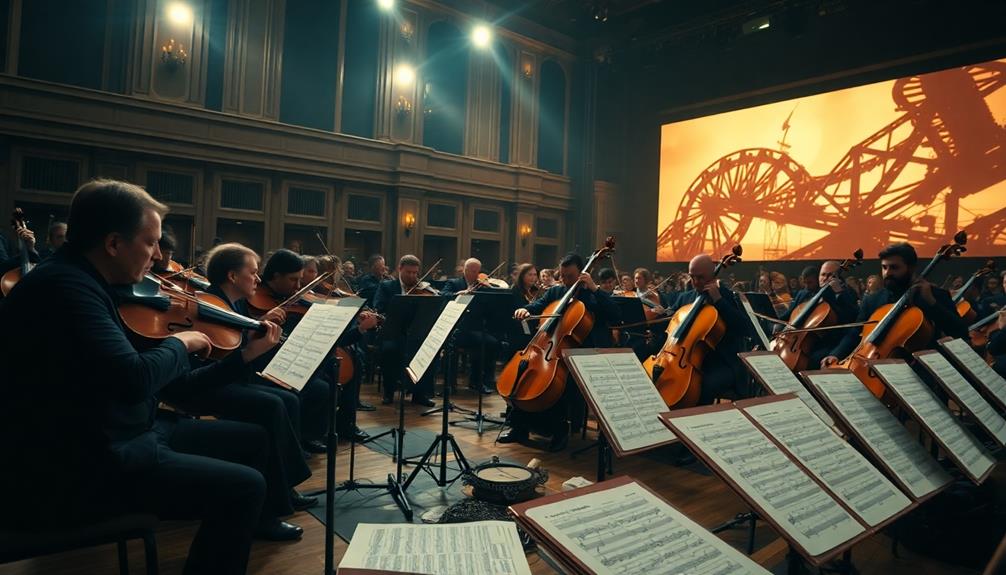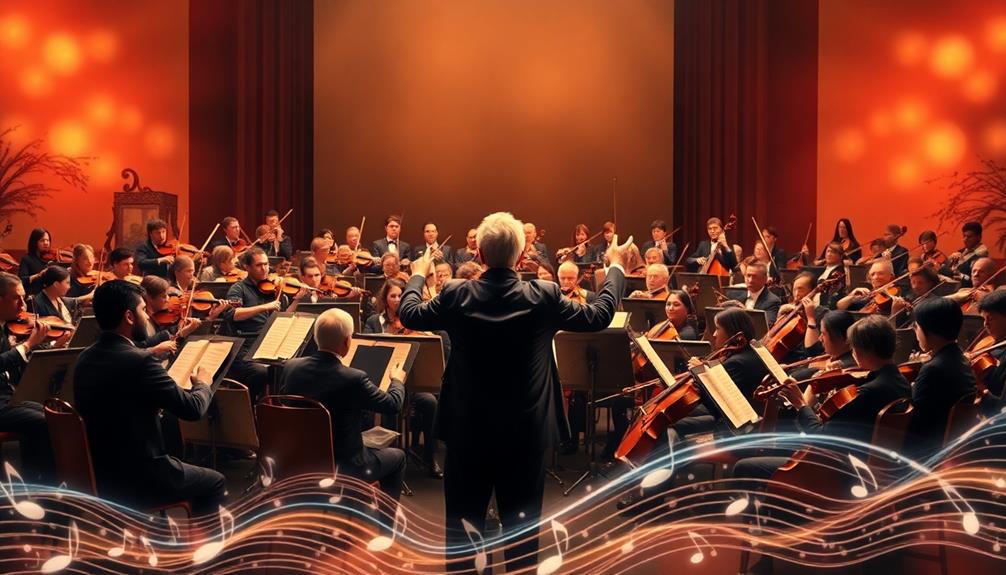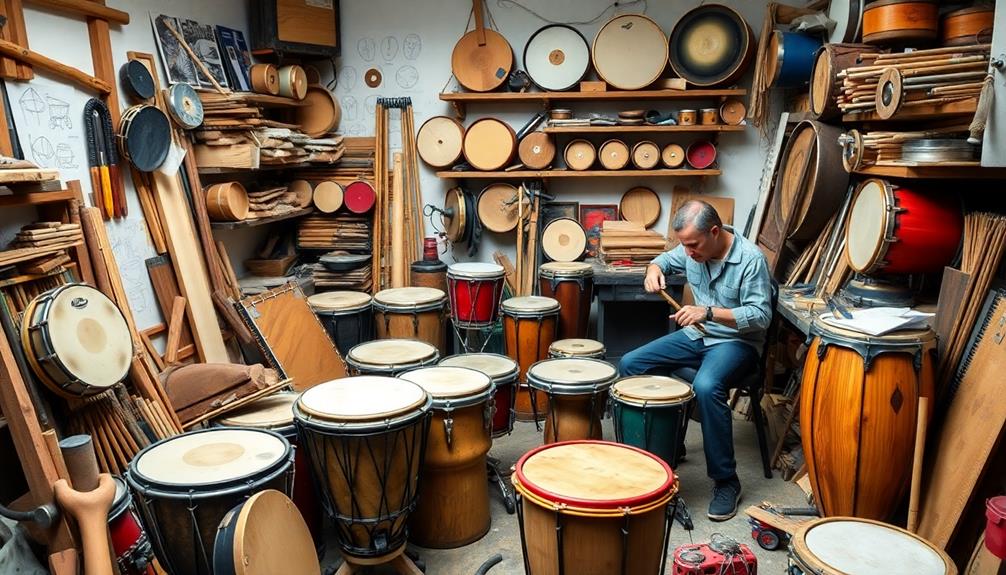To build impactful hits for film scoring, you've got to focus on emotional storytelling. Collaborate closely with directors to align your vision and understand key narrative moments that need enhancement. Develop memorable motifs that resonate with characters or themes and use dynamic contrasts to amplify emotional highs. Experiment with blending orchestral and electronic elements for unique soundscapes. Always aim to support the storytelling without drowning out dialogue or effects. Remember, effective scores guide the audience's emotions throughout the film and should leave a lasting impression, setting the stage for even greater creativity ahead.
Key Takeaways
- Collaborate closely with directors to ensure the score aligns with the film's vision and emotional journey.
- Develop memorable motifs that resonate with characters and themes, enhancing audience connection.
- Utilize dynamic contrasts in instrumentation to amplify emotional intensity during pivotal scenes.
- Incorporate sound design techniques to add realism and depth to the score, enriching the viewing experience.
- Engage in continuous learning and adapt to industry trends to create innovative and impactful scores.
Importance of Film Scores

Film scores play an essential role in storytelling, enhancing the emotional depth of scenes and shaping how you perceive a film. A well-crafted film score can evoke specific emotions, guiding you through the narrative and making you feel more connected to the characters. Composers like John Williams and Hans Zimmer have mastered this art, creating iconic music for the film that resonates long after the credits roll.
Their scores help define the mood and atmosphere, effectively transforming your viewing experience. When you listen to a powerful score, it heightens the emotional impact of pivotal moments, pulling you deeper into the story. The absence of a film score can leave scenes feeling flat, diminishing the narrative's power.
By weaving music throughout the film, composers enhance the films, establishing tension, joy, or sorrow in a way that visuals alone can't achieve. Moreover, advancements in sound design and music production have opened new avenues for creativity, allowing for immersive soundscapes that draw you in.
Ultimately, a film score isn't just background music; it's a crucial storytelling tool that shapes your emotional journey and engagement with the film.
Understanding Movie Scores

Scores crafted for movies serve as original compositions designed to elevate the viewing experience, intertwining music with the on-screen action. Film scores play a significant role in enhancing the emotional depth of a film, creating a connection between the audience and the narrative. Without a score, a film can feel incomplete, lacking the tone and mood necessary to engage viewers fully.
Film composers often utilize musical themes, or leitmotifs, to establish recurring motifs tied to specific characters or ideas. This technique strengthens storytelling and reinforces emotional resonance throughout the film.
The collaboration between composers and directors is essential; it guarantees that the music aligns with the film's vision and effectively conveys its emotional beats.
Iconic movie scores, like those from John Williams and Hans Zimmer, have left an indelible mark on popular culture. Their ability to create memorable, emotional soundscapes has influenced modern film music profoundly.
During the recording process, these composers bring their visions to life, crafting soundtracks that not only support the story but also resonate long after the credits roll. Understanding movie scores is fundamental for anyone looking to create impactful hits in film scoring.
The Scoring Process

The scoring process is a vital stage in filmmaking that involves an in-depth exploration of the narrative and emotional landscape of the story. As a film composer, you start by understanding the film's core themes and desired emotional tones. This often requires you to collaborate closely with the director through meetings that clarify these elements.
Next, you engage in iterative composition, where you sketch initial ideas on instruments like the piano or synthesizers. This phase allows you to explore various musical motifs and identify key emotional beats that need musical emphasis. Throughout this process, feedback is essential; spotting sessions help pinpoint where music will be placed for maximum impact.
Once you've crafted the score, final review sessions come into play. These sessions are critical for evaluating the music's effectiveness and may lead to revisions in composition, orchestration, or mixing.
Collaboration with orchestrators and music editors also enhances your arrangements, ensuring the music is seamlessly integrated into the score and aligns with the film's creative vision. Through this methodical approach, you create a score that enhances the storytelling experience.
Characteristics of Effective Scores

Creating a compelling score requires a keen understanding of its characteristics that elevate the film's overall impact. Effective movie scores resonate with the emotional tone of the film and enhance the viewer's experience through various musical elements.
Here are three key characteristics to contemplate:
- Alignment with Atmosphere: Your film music should match the film's atmosphere, using appropriate styles to draw the audience in and create a memorable experience.
- Motifs and Thematic Development: Incorporate motifs that link to character arcs or themes. This continuity helps the audience connect emotionally and provides familiarity throughout the film.
- Dynamic Contrast and Balance: Utilize dynamic contrasts and varied instrumentation to amplify emotional moments. Ascertain that your original music enhances the film without overshadowing dialogue or sound effects, keeping storytelling clear and engaging.
Iconic Composers and Their Works

When you think of unforgettable film moments, it's often the music that lingers in your mind. Iconic composers like Hans Zimmer and John Williams have crafted scores that elevate the cinematic experience.
Zimmer's innovative fusion of orchestral instruments and electronic elements in films like *Inception* and *The Dark Knight Trilogy* reshapes how we perceive film music today. Meanwhile, Williams has given us some of the most recognizable themes in history, from *Star Wars* to *Jaws*, earning multiple Academy Awards for his extraordinary contributions.
Then there's Ennio Morricone, whose unique soundscapes in *The Good, the Bad and the Ugly* left an indelible mark on film composition, influencing countless composers across genres.
Bernard Herrmann pushed boundaries with his avant-garde score for *Psycho*, using dissonance and unconventional sound design to evoke a chilling atmosphere.
Finally, Miklós Rózsa's rich orchestration in *Ben-Hur* not only won him an Academy Award but also established him as a pioneer in the field.
These composers didn't just score films; they created music that resonates long after the credits roll.
Tips for Successful Film Scoring

Understanding the film's story and emotional core is key to successful scoring. To create a score that resonates, consider these essential tips:
- Collaborate closely: Work with the director and other creatives to guarantee your musical ideas align with their vision. Open communication fosters feedback that strengthens the score's impact.
- Identify key moments: Recognize pivotal scenes where music can amplify emotional highs and lows. Strategic placement of original motifs during these moments enhances the film's atmosphere and narrative flow.
- Master technical aspects: Pay attention to orchestration and mixing to deliver a polished score. A well-integrated soundtrack blends seamlessly with dialogue and sound effects, enriching the viewer's experience.
Creative Techniques for Impact

Creative techniques can greatly enhance the emotional impact of a film score. Begin by developing memorable motifs that represent your characters or themes. This familiarity helps forge an emotional connection with the audience, making your score more impactful.
Experimenting with a blend of orchestral and electronic elements can also elevate the overall atmosphere, crafting unique soundscapes that deepen the narrative.
Don't underestimate the power of dynamic contrasts. By varying instrumentation and intensity, you can amplify emotional highs and lows during critical scenes, drawing the audience deeper into the experience.
Incorporating sound design techniques like Foley and environmental sounds adds realism, allowing the score to complement the film's world seamlessly.
Strategic music placement is essential. Identify pivotal scenes where your musical score can underscore emotional beats or shifts, ensuring that each cue aligns with the storytelling.
By integrating these creative techniques, you'll not only enhance the emotional landscape of your films but also create a score that resonates powerfully with viewers.
Building Industry Relationships

Building strong industry relationships is essential for any film composer aiming to succeed in the competitive landscape of Hollywood. Personal connections can greatly increase visibility and create opportunities that might otherwise be out of reach.
Here are three key strategies for building industry relationships:
- Networking at Film Festivals: Attend industry events to meet directors, producers, and potential collaborators who can influence your career trajectory. These events are ripe with opportunities to connect.
- Collaborating with Local Colleges: Partner with film programs to work on student projects. Many aspiring filmmakers seek composers for their short films, providing you with valuable experience and exposure.
- Seeking Mentorship from Established Composers: Don't hesitate to reach out for guidance from seasoned professionals. Their insights can open doors and help you navigate the industry effectively.
Additionally, maintaining strong studio staff relationships, including with engineers and producers, enhances collaboration quality.
By focusing on these strategies, you'll not only establish a robust network but also position yourself for long-term success in film scoring.
Frequently Asked Questions
What Makes a Successful Film Score?
A successful film score aligns with the narrative, enhancing emotional depth through recurring themes. It balances with dialogue, ensuring clarity, while innovative instrumentation creates unique soundscapes, all achieved through collaboration between you and the director.
How Does Hans Zimmer Compose so Much?
You'll find Hans Zimmer composes so much by blending orchestral and electronic elements, sketching ideas on piano, embracing improvisation, and drawing inspiration from diverse genres, all while collaborating closely with directors to enhance storytelling.
What Three Elements Are the Most Important in Analyzing Film Music?
To analyze film music effectively, focus on emotional resonance, thematic development, and integration with visuals. These elements deepen audience engagement, ensuring the score enhances narrative and character arcs while creating a memorable cinematic experience.
How to Create Soundtracks for Movies?
To create soundtracks for movies, you'll analyze the film's emotional core, collaborate with filmmakers, and select or compose music that enhances key scenes while ensuring a balanced mix with dialogue and sound effects for a cohesive experience.
Conclusion
In the world of film scoring, you've got to think outside the box to create music that resonates. By understanding the essence of movie scores and honing your unique style, you can make a lasting impact. Remember, it's not just about hitting the right notes; it's about telling a story that complements the visuals. So, roll up your sleeves and plunge into it—success is just around the corner if you're willing to put in the work!










